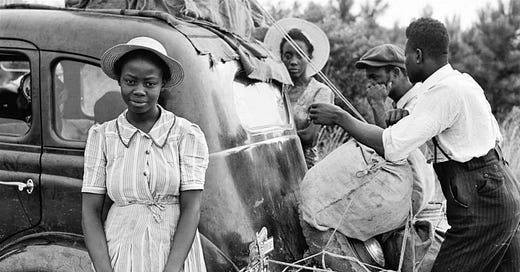The moral courage to confront hard truths about our history is both a Christian and civic imperative. Understanding the oppressive histories of America—especially those rooted in systemic racism and anti-Blackness—is not about shaming anyone or revisiting the past for its own sake. Instead, it’s about ensuring that these patterns are not perpetuated. By reckoning with these truths, we position ourselves to live out the Gospel’s call to love our neighbors as ourselves. This doesn't just free others: it helps us all discover our true humanity.
A History of Injustice: Systemic Racism’s Deep Roots
America’s history is inseparable from the racial hierarchies it has built and sustained. From the inception of slave patrols as a precursor to modern policing to the economic and social stranglehold of redlining, this nation’s structures were designed to marginalize Black Americans. Practices like the Sundown Towns and the reliance on “separate but equal” laws institutionalized segregation and enshrined inequality.
This history isn’t simply “in the past.” Its echoes reverberate in modern policies like the school-to-prison pipeline, environmental racism, and mass incarceration. These injustices are not anomalies but extensions of a legacy that began with the brutal dehumanization of enslaved Africans.
The Bible’s Call to Justice: “Woe to Those Who Decree Unrighteous Decrees”

Scripture calls us to be honest about wrongdoing and to act against injustice. Isaiah 10:1 warns, “Woe to those who decree unrighteous decrees, who write misfortune, which they have prescribed.” The policies and practices of systemic racism are examples of such “unrighteous decrees.” To ignore or deny this history is to abdicate our responsibility as Christians to challenge sin in all its forms.
Like the prophets of old, we must recognize that silence in the face of injustice is complicity. By understanding our history, we cultivate the awareness needed to dismantle oppressive systems.
Why Remembering Oppressive Histories Matters
A common refrain is, “Why dwell on the past?” The answer is simple: forgetting the past makes us prisoners of its legacy. As James Baldwin famously said, “Not everything that is faced can be changed, but nothing can be changed until it is faced.”
Understanding the Past Informs a Better Future: Knowing about atrocities like the Tulsa Race Massacre or the terror of lynchings helps us see the consequences of unchecked hatred and systemic inequality. These lessons guide us toward creating equitable systems.
Accountability and Repentance: The Christian faith is rooted in the idea of repentance. We must confess collective sins—like those of cultural erasure, economic exploitation, and racial violence—and turn toward righteousness.
Breaking Cycles of Oppression: Oppressive systems thrive in ignorance. Education about history disrupts these cycles, fostering empathy and a commitment to justice.
The Christian Imperative: Love in Action
Jesus calls His followers to love one another deeply (John 13:34). This love demands honesty, even when it’s uncomfortable. In embracing the truth about America’s racial history, Christians can live out the Gospel by:
Advocating for Justice: Support policies that address racial disparities in housing, education, and criminal justice.
Centering Marginalized Voices: Amplify the stories and perspectives of those historically silenced.
Promoting Education: Fight against the erasure of Black histories in schools and communities.
Repenting of Complicity: Acknowledge the ways Christian institutions have participated in or benefitted from systemic racism and commit to transformative action.
The High Cost of Denial
Denying systemic racism and its historical roots gaslights entire communities, undermining efforts for equity and reconciliation. It also chains us to destructive patterns of division, exploitation, and fear. For Christians, this denial is particularly grievous—it runs counter to the Gospel’s call to truth and justice.
Learning from the Past, Building a Better Future

Facing America’s racial history isn’t an exercise in blame; it’s an act of hope. Hope that by understanding the sins of the past, we can avoid repeating them. Hope that through truth, we can build a future rooted in justice, equity, and love.
As Christians, we are called to be salt and light in the world, transforming it with God’s love. Part of this transformation involves the moral courage to confront oppressive histories honestly and work to ensure they are not repeated. By doing so, we fulfill the call to “act justly, love mercy, and walk humbly with our God” (Micah 6:8).
This work is not easy, but it is necessary. And as the Bible reminds us, the truth will set us free (John 8:32). Let us, then, have the courage to face our history and use it to forge a more just and loving future.
Amanda Golden-Peace
The Misogynoir to Mishpat (M2M) Research Network © 2025





Forgetting the past makes us prisoners of its legacy. As James Baldwin famously said, “Not everything that is faced can be changed, but nothing can be changed until it is faced.”